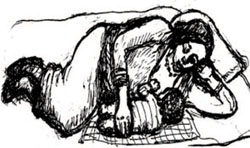Mood disorders in the postnatal period

The first two months after childbirth (see Figure 12.3) are associated with increased risk of depression. The most common condition is called postnatal blues, which is a mild and transient depression occurring in the first five days after the child is born in about 50% of mothers. The mother feels easily upset, tearful and less confident about herself and her role. Support and reassurance from husband and family is sufficient. Some simple traditional practices that give a sense of security, such as keeping a metallic item under the pillow, and practices indicative of support from husband and family, are also important. But the blues can progress into more severe depression.
What do you think are the similarities and differences in symptoms of postnatal depression and depression occurring at any other time?
If you thought that the symptoms are generally similar, you would be correct. The reason why postnatal depression has a separate name is because depression is common in this period.
Additionally, in postnatal depression, mothers tend to worry a lot about their child and their ability to look after the child. They also worry about their appearance and whether their husband has the same affection towards them. The treatment is similar to ordinary depression. But note that the child could be at risk of harm from either violence or neglect by the mother (see Section 10.4 of Study Session 10). Therefore, enhancing support and managing potential risk are important.